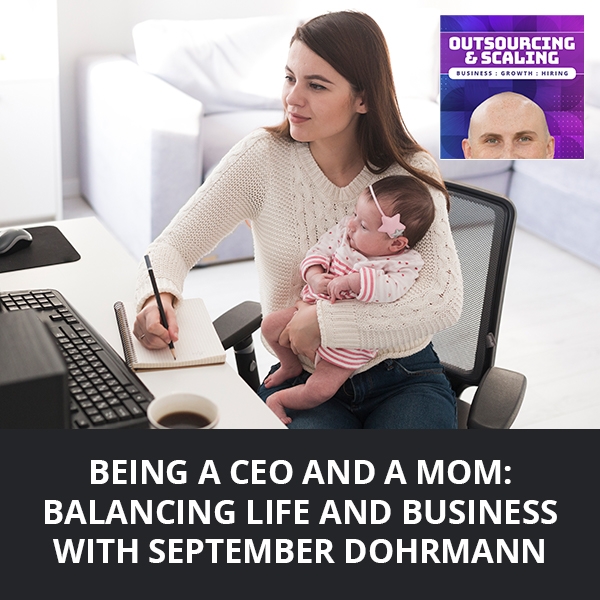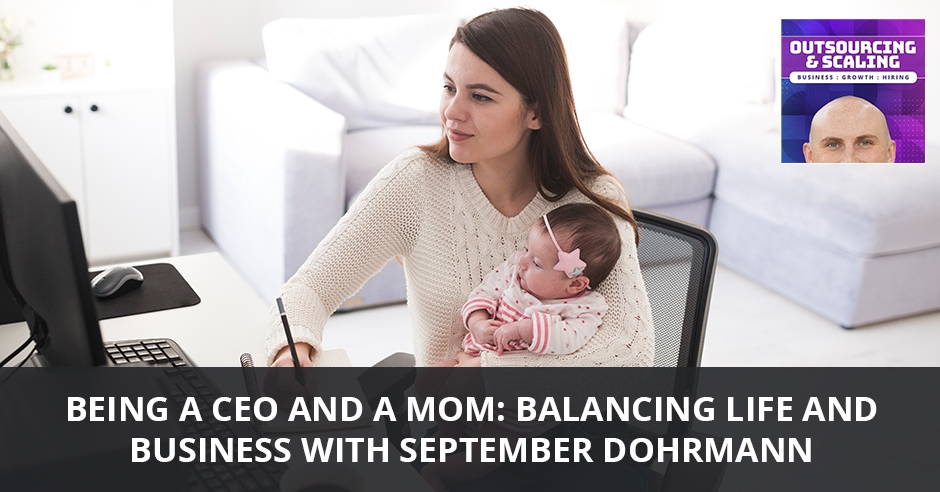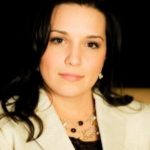


Being a CEO at home and at work requires top skills and more energy. September Dohrmann, the President and CEO of CEO Space International, shares how their company came about, how she is handling her job as the CEO, and how she constructed her team. Applying her skills as a mom, September is able to effectively manage her family and job at the same time by balancing tasks with commitment. For her, communication from the heart and not from your ego is the key to becoming an effective CEO. Know more about how September makes being a CEO a manageable task in this episode!
—
Listen to the podcast here:
[smart_track_player url=”https://www.podetize.com/statsapi/www.podetize.com/wp-content/uploads/fileuploads/11-5b145ef137b51b3d1af0633e9305c43d/08/2019/157d3b1a14b046b219e926fb74eb6d8e.mp3″ title=”Being A CEO And A Mom: Balancing Life And Business with September Dohrmann” artist=”Nathan Hirsch” image=”https://freeup.net/wp-content/uploads/2019/04/OAS.png” ]
Download the audio file here.
Being A CEO And A Mom: Balancing Life And Business with September Dohrmann
Welcome back to the show. We are here with a very special guest, September Dohrmann. September, how are you doing?
I’m doing fantastic, Nate. How are you?
I’m doing great. It’s always good to talk to you. A while ago you introduced me to CEO Space which I’m a big fan of and we will talk all about that. For those of you that don’t know, September is now the CEO of the CEO Space and we’ll dive into it, but first I want to take a gigantic step back and let’s talk about you growing up. Were you a straight A student? Were you a rebel? Did you always know that you want to be an entrepreneur?
I always knew that I wanted to own a business. Both of my parents own their businesses and I really don’t know another way of operating. I’ve had jobs in the past and one of my careers was as a cosmetologist and quickly moved up in the salon that I worked in and grew very fast a clientele. I always had an issue being an employee because of my ownership that I feel like I bring to the table. I always knew that I wanted to help people. That was the foundation of it. I always knew that running my own business was going to be the better fit of me. A student, hardly. My social study teacher gave me a D just so I wouldn’t fail the ninth grade because I was terrible with History.
At what age did you start your first business or really get into entrepreneurship?
As a kid, my parents would have me work in their businesses. I remember being about eight or nine helping them out with things. My mom had several daycare centers in Nashville. There was a lot of kids and all three of them. On the weekends I would have a weekend job there and my father had a construction company in Nashville. I would help out with secretarial items. I’d go to job sites with him and he’d show me what he did on a day-to-day basis. I learned from both of them. I watched how they were with customers. I watched how they were with their vendors and that sort of thing and then how they ran their businesses day-to-day.

It sounds like in those businesses, you are surrounded by a lot of people. Did you learn a lot about managing people in general?
I really did. I have to say that my foundation of managing people was primarily on a job site and in construction. At that time, culture wasn’t a word. Nobody spoke of culture in the ‘80s and the ‘90s. You had to have a heavy hand on the construction site because a lot of these guys just wanted to get the job done so they can go get drunk at the end of the night and hopefully show up the next day. You had to manage them with the heavy hand. In the daycare business for my mom and her businesses, she also had a heavy hand, but it wasn’t like construction. When I look at what I’ve learned about managing people, there’s such a contrast that it was, “Get the job done. This is your responsibility. You need to do this.” What I’ve learned is it’s actually more of a heart space process. You’ve got to come from the heart when you’re working with people. You have compassion and empathy for them and then also push them to their greatness, not just force them to get their job done.
That makes a lot of sense. Do you remember who your first hire was? How did it go?
The very first person I hired was a freaking nightmare. This lady, on her second day on the job, she came in with these big boxes of decor and she totally decorated her office but did nothing in accounting. It was so horrible, but she was very good in her interview. She talked a really good game.
Let’s talk about CEO Space. How did that come about? What was the idea behind it?
Bernie Dohrmann, my husband, is the founder of CEO Space. He came up with this idea about 30 years ago, him and Bob Proctor in a mastermind. Bernie has a colorful background. You can find out about that online and we’re very transparent about that. He went to prison for what he should have known. He was surrounded in this very competitive, cutthroat environment. It was really gross and it was damaging to the people that weren’t the strongest wolves in the pack. You are left behind if you weren’t the strong wolf. He wanted to change that. He wanted to create an environment where that wasn’t the case, where people collaborated and contributed to one another and understood this concept of cooperation and collaboration. Really, that’s the background story of where CEO Space came from and it’s just evolved from there.
When you set expectations, it has a ripple effect. Who you attract matches those expectations versus just bringing in anybody.
Let’s talk about you stepping into the CEO role because I feel like a lot of people, they think that they’re the CEO, but they’re really a business owner. They’re not equipped to it. What does being a CEO actually entail and what was it like stepping into that after Bernie started CEO Space?
I evolved. I was starting out as helping him with little things here and there and then I moved into a VP position and then I moved to a COO position and then it moved into CEO. With COO, it’s very task-driven. Your responsibility is to make it happen. You oversee all the projects. With the COO, there was a part of me that had to let go of that. I still have it. It’s still a responsibility. It’s my responsibility to move things along, but I do it through relationship development. To me that is the biggest piece that CEOs need to be aware of. Your job is to build relationships, relationship with your customer, with your vendors, with your team members and everybody that’s involved in your company.
Talk to me about your team now because I’ve met a bunch of them and they’re awesome. They’re A players. How have you gone about constructing a tea, building a team and managing a team going forward?
I stepped into a team that I had adopted. One of my greatest accomplishments is being a mom and I have two boys. They are twenty-one and seventeen. I learned a lot about structure, discipline, expectations, accountability and responsibility. To me that was one of the first elements that needed to come into play is you have to set the expectation for your team. The thing about it is it was a little uncomfortable because I thought, “These are adults. They should know how to be professionals. They should know how to adult professionally. The reality is that we all need accountability. We all need structure. I work with three coaches for my own accountability because I know it’s important. Nobody else is holding me accountable but myself. At this level, you need to bring in those pieces. When it comes to a team, the structure is absolutely it. What are the expectations? What I’ve learned from that is that when you set expectations, it has a ripple effect. Who you attract matches those expectations versus just bringing in anybody because they have a pulse.
I want to touch upon the mom piece. It’s something that I can’t personally speak on. For someone listening out there that is an entrepreneur or wants to be an entrepreneur or they have kids, they have a family, they have the responsibility, what would you tell them on how you’ve been able to have success while also raising a family?
It’s definitely a balancing act. That heart space management if you will, it was easy to do that in business because that’s who I am naturally as a mom. I had help. My husband, he’s older than me so he has a little bit more experience and he’s been great as a sounding board, as somebody that’s observing the behaviors and saying, “You could do it a little bit differently.” What it really boils down to is communication. Communication from the heart, not communication from an ego place or from a control place because it goes against the grain. It’s to go with the flow and to listen and to be present. When I was growing up it was, it should be seen, not heard. To say something, to stand out and to be yourself, it wasn’t received well.

When I became a parent, that was one of the big elements that I wanted to bring into my children’s life because I want them to be comfortable to express what they’re feeling in that moment. You don’t have to yell, you don’t have to be little jerks about it. Teach them how to communicate. Teach them how to say what’s on their mind in a respectful way that really conveys the truth for them and to listen and to receive it and just be present to that. I can honestly say it’s the exact same thing when you’re working in business. Listen and have compassion when you’re talking to people and still drive your goals. Those are important.
Talk about goals. Are you someone that’s planning years in advance? Are you planning months in advance? I know you said you have coaches that are keeping you accountable, but how are you planning the year ahead? I’m sure you have big plans. Talk to us a little bit about that.
We have a big picture. We’re always visiting that big picture about quarterly for us. We do five events a year, so for us to run our business quarterly doesn’t work for us. What we have to do is we run our business cycle to cycle. That’s in between each event that we hold. We take the big picture, we chunk it out and we say, “This cycle, this is what we’re going to accomplish.” If we don’t accomplish that goal for one reason or another, we just move it over to the next cycle and continue to add goals to reach that bigger picture for that year, for the three years, five years, ten years, then ultimately the bigger vision of CEO Space.
Talk to me more about CEO Space. You and I know what it is. For the audience, what can they expect? You’re putting on five events a year. Talk to us about how you structure these events and why.
I love my job. I love what I do. I feel so fortunate to be able to work with amazing people. We’ve created an environment that first of all, everybody signs in the NDA when they come in so that you have the freedom to share where you are, to be vulnerable, to talk about your project, and not worry about somebody taking your idea or running with it. We believe that it’s a safe place to work in. Another layer that we’ve added on to make it a safe place is that all of our subject matter experts, our faculty, the people that are teaching, they’re all vetted. They have a background check done. We’d cross our T’s and dot our I’s and make sure they are who they say they are and they can do what they say they do.
We look for that track record and we look for how are they showing up online? Do they have a beautiful website? Are they taking care of their customers on social media or are they ignoring them? We pay attention to those pieces. We get feedback off of what their services are. That’s at the high level. That’s the leadership level. On the customer level with our members, we look for high achieving business owners, people that are hungry. They know that they’re ready to take their business to the next level. You really just want to be a part of a tribe of likeminded individuals that believe in contribution. A big element of what we deliver is the experience of reciprocity.
If you’re committed, you’re committed all the way and it is not an easy road.
Nate, when you came to CEO Space, all of our networking is based around, “What’s your name? What are you working on and how can I contribute?” We’re always encouraging our customers to give first. What happens in that is magic. When you give first and you show up as service, what you need is there for you. It shows up for you and better than what you thought it could. It’s really a beautiful process. Justin and Tonya Recla, they’ve been a part of CEO Space for quite some time and it has been such a pleasure to watch them morph in these amazing business owners that have six businesses. They had no business when they came to CEO Space. Now, they have six, two of them are well into their six figures. They’re very vocal about that and they contributed to this law of reciprocity, this synergistic collaboration that they’ve experienced at CEO Space where you contribute to one another and through that what you need shows up.
Tonya and Justin are big clients of FreeUp. They’re going to be on the show along with their daughter who’s also an entrepreneur. I forget how old she is, but she’s crushing it as well. It’s pretty cool to watch them just keep doing what they’re doing. One of the other things I wanted to mention is the meal table. It’s a big part of CEO Space. All the faculty, they sit at different tables. If I’m there as a hiring guy, there’s another table with the marketing guy, another table with the real estate guy. As someone is going there, as a member, you can decide to sit with whoever you want and pick their brain for the entirety of each meal. I always thought that was cool. You guys have a lot of different activities as well. Talk to me about feedback because I know one thing that you guys do is after I spoke, you would ask people for feedback. I know you’re asking it on social media and to your clients and dear to the people on your team. How important is feedback to growing your business?
It’s very important. You need to have something echoed back to you. When you’re taking action to have it echoed back to say, “This is what the experience is like for me in the field.” Think about it as you’re a sales team leader. You’re not in the field. You need your sales team to give you feedback to know what the heck is going on out there. You’re playing at a different level when you’re running a company. You’re not in the experience like your customer is, so to get their feedback is crucial. You also have to use discernment with feedback. If you’ve got a thousand customers, if two people complain about something, consider it. Listen to it. Oftentimes, people just want to be heard and you give them that sounding board. When you hear feedback consistently enough over your customer base, that’s when you really start to pay attention. To ask customers constantly for feedback, you’re looking for those common threads that show up so that you know what kind of actions you take.
That makes sense. Talk to me about strengths and weaknesses, because I feel like a lot of people as the CEO of maybe a smaller business, they just try to do everything. Have you identified what you’re good at and if so, what is it? What do you not get out there that you delegate to other people?
That’s a fun conversation. I’m choosing to grow our company in a way where I really want to understand all of our processes and then pass them off to somebody else. I know that you adopt a very similar model. In fact, I believe you are known to say, “I will work a process for no more than three months, then I hand it off to somebody else to run that process.” I’m aware of my weaknesses. Majority of the time there will be situations where I’ll go in, I’ll say this is my strength, but then a situation will arise where I go this particular item is not my strength. Let me reach out to somebody. Who can I call? Who do I know that can give me some guidance or offer some suggestion around that? To me that’s the whole the foundation of being a part of a tribe.
It doesn’t have to be CEO Space. You can be in anyplace. Just find yourself a community, a group of likeminded people that you can call on just as a sounding board; just for advice. When it comes to the weaknesses, I embrace them. I learn what I can do to overcome this because I need to figure out that process so that I can hand it off. At the end of the day, if one person falls out of the company or moves on in their life and I need to step in to fill in their shoes until we get a permanent person, I will personally. I want to make sure that I know how to run that process until I can get somebody else in there. The whole thing with that is that when you know what you’re doing, what that role needs to look like, it sets the bar. That’s why I want to bring somebody in better that can take it to the next level. If you don’t have that bar set, you don’t know what that next level looks like and who can deliver it.

What would you tell other entrepreneurs that are listening? The opportunities are there. Sometimes it’s overwhelming to figure out what they should be doing and how they should be prioritizing. You work with a lot of entrepreneurs. What advice do you have for people listening?
It’s an interesting question. I’ve got a lot of different ways that I can answer that and all I can offer is my personal experience and that is you’ve got to find a way to balance your life. You have to. For me, meditation is key. That has to be a part of my routine in the morning. It keeps me grounded. When you step into business, it can be scary. Not everybody always has support. Families don’t always support those that want to step out on their own. I often hear, “When I’m starting a business, my family’s telling me I shouldn’t because I’ll fail at it.” Don’t buy into their fear stories. That’s their fear story, not yours. You do what you do. You do what is right for you and your life and you surround yourself with people that can support you and that is key.
You cannot do it alone. I’ve had some experiences that has forced me to really reach out for more help, which is not my nature. I have a small group of people that I’ll go to, but I’m ready to take my humility to another level and reach out and ask people for more help than I ever have before. I’m ready. I’m hungry. I want to see the end. I want to see that vision so badly that I’m willing to do anything that it takes. That’s my advice to anybody. If you’re committed, you’re committed all the way and it is not an easy road, but is it sure worth it.
September, this has been awesome. Where can people find out more about you? Where can they find out more about CEO Space? What are you most excited about for the rest of the year?
You can find out about CEO Space by going to CEOSpaceInternational.com. You can learn more about me by checking out my LinkedIn profile, September Dohrmann. You can connect with me on LinkedIn there. The most exciting thing is the marketing pieces that we’re putting together. We’ve been around for 30 plus years and in that time we’ve only grown word of mouth. When I stepped into the CEO role, one of the things that I had to do was reorganize and restructure the company. That was a big element. Now, that it’s all behind us and that we really have those systems and structures in place, our saying, “How do we get the message out there? How do we let people know about contribution and reciprocity and collaboration and cooperation in business and the effect that that has on your circle, on your organization?” I’m really excited about the pieces that we’re bringing together for our members to keep them closer together and to keep the experience of the forum going even between the events. It’s a really beautiful thing. I can’t say it enough. I love what I do.
Thanks so much for joining us, September.
I appreciate you having me, Nate. Thank you.
Important Links:
About September Dohrmann
 September Dohrmann is the current President and CEO of CEO Space International. In what Forbes.com called a “must-attend” for entrepreneurs, the CEO Space Business Growth Conferences are strategically scheduled five times each year to create a steady pace of growth.
September Dohrmann is the current President and CEO of CEO Space International. In what Forbes.com called a “must-attend” for entrepreneurs, the CEO Space Business Growth Conferences are strategically scheduled five times each year to create a steady pace of growth.
For over 25 years, CEO Space International has brought together business leaders, investors and entrepreneurs to create a networking environment unlike any other. By developing meaningful, mentor-driven relationships, professionals are able to get the help they need in a cooperative environment.
Her past positions with the company included Vice President and Chief Operating Officer. In addition to her role as CEO, September serves as the Vice Chairwomen of the CEO Space Board of Directors.
Prior to joining CEO Space, September was a licensed real estate agent and specialized in the purchase and turnaround of distressed properties. Her portfolio of over 2 million dollars was focused on residential properties in the state of Tennessee.
September lives in Tampa Florida with her husband Berny, and her two sons, Daniel and Preston
